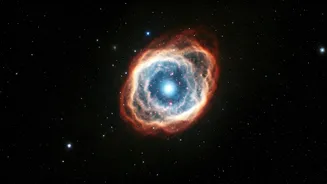The Cosmic Isolation
The 'Solitude Zone,' a concept born from theoretical astrophysics and astrobiology, suggests that there may be regions of space, even vast areas, where
the conditions for complex life, as we understand it, are either unfavorable or actively prohibitive. This isn't about the absence of stars or planets, but rather about the presence or absence of the right environmental conditions, which are deemed critical for the development of complex life forms. This theoretical zone focuses on the unique variables that could limit the prevalence of advanced civilizations. These variables range from the formation and evolution of stars and galaxies to the availability of specific elements and the influence of cosmic events like gamma-ray bursts or supernovae. This perspective diverges from the simple assumption that if the building blocks for life exist, life necessarily will arise and thrive. Instead, the 'Solitude Zone' proposes that there might be critical thresholds or specific environmental conditions that, if not met, would drastically limit the emergence or evolution of complex life.
Factors Limiting Life
Several potential factors contribute to the hypothetical 'Solitude Zone.' For instance, the metallicity of a galaxy, which refers to the abundance of elements heavier than hydrogen and helium, plays a crucial role. These heavier elements are produced inside stars and dispersed into the cosmos when they die. These elements are essential for forming rocky planets like Earth. Regions with extremely low metallicity may not have enough raw materials to form planets capable of supporting life. Another factor concerns the frequency of disruptive cosmic events, such as gamma-ray bursts or supernovae. If a region experiences these cataclysmic events too frequently, they could sterilize any planets in the area, wiping out or severely limiting the development of advanced life forms. Furthermore, the galactic environment, the structure, and activity of the galaxy itself, significantly influences the viability of life. A galaxy's shape, its spiral arms, or its central black hole, can affect the availability of resources or the frequency of hazardous events. Finally, the timing and location within a galaxy are also important. The early universe and certain parts of galaxies might not offer the right conditions to foster life.
Searching for Answers
The concept of the 'Solitude Zone' challenges scientists to think more deeply about the conditions that make life possible. This framework reshapes how we understand the universe. It encourages a closer examination of what makes our planet unique, and why life originated on Earth. Furthermore, the implications are very important for the search for extraterrestrial life. Rather than simply searching for any planet in the habitable zone, the concept prompts astrobiologists to consider the specific environments. It helps refine the search, targeting regions with favorable conditions, such as high metallicity, minimal exposure to dangerous cosmic events, and a suitable galactic location. The James Webb Space Telescope and other advanced instruments contribute by allowing us to study the atmospheres of exoplanets in detail. They help to identify potential biosignatures—gases in the atmosphere that could suggest the presence of life. By understanding the factors that constitute a 'Solitude Zone,' researchers can narrow down the search for life beyond Earth.
Implications and Future
The concept of the 'Solitude Zone' has far-reaching consequences that touch upon our understanding of the universe and our place within it. If such zones are real, it could suggest that complex life is rare, and the conditions that allowed life to flourish on Earth are exceptional. This finding will change our perspective and challenge existing beliefs. On the other hand, the absence of a 'Solitude Zone,' implying that the universe is teeming with life, would be just as revolutionary. Either way, this theoretical framework enhances the scope of astrobiology and astrophysics. It shapes the way that we study the cosmos and look for life beyond Earth. As technology evolves and we gain a more thorough understanding of the universe, it's expected that the concept of a 'Solitude Zone' will be refined. With ongoing research, this concept acts as a driving force behind innovative space missions and scientific inquiries. It leads to discoveries that may unveil the secrets of the cosmos and the question of whether we are alone.




















